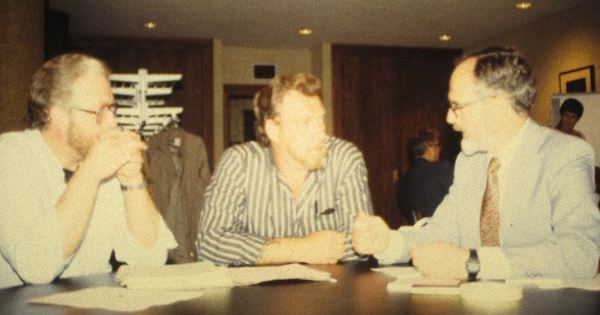I am joining the ASQ Influential Voices project for 2012. The effort started last year when ASQ chose a few people to participate in a group effort to share their thoughts on various topics in quality improvement. I have been asked to join for 2012, along with a couple lean bloggers (Mark Graban and Tim McMahon) and others. Each month the ASQ executive director will post on a topic and I, and the other influential voices participants, will share out thoughts on that topic.
My history with ASQ extends back into my childhood. My father, William Hunter, was the founding chair of the ASQ Statistics division. They now administer the Hunter Award, which recognizes substantial contributions to statistical consulting, education for practitioners, and integration of statistics with other disciplines as well as demonstrated excellence in communication and implementing innovative applied statistical methods.
I joined with a group of people to lead the Public Sector Quality Improvement Network shortly after it was formed. The network aimed to help those in the public sector use quality management principles to improve performance. That group of people was one of the most impressive I have worked with; including Tom Mosgaller, Michael Williamson, Barry Crook, Nathan Strong and others. We decided to join with ASQ: that effort has become the ASQ Government Division. Another outgrowth of those efforts was my Public Sector Continuous Improvement Site, which I continue to run.
The Public Sector Network also connects back to my father; Tom Mosgaller and Michael Williamson worked on the quality efforts in the Madison, Wisconsin (at the City of Madison and the University of Wisconsin – Madison). Michael worked in for Joe Sensenbrenner, and then brought the new management ideas to his roles with university. My father approached the mayor, Joe Sensenbrenner, about applying management improvement ideas at the city. The mayor agreed and my father documented that effort in Dr. Deming’s classic, Out of the Crisis as the first government application of Deming’s management principles. See pages 245-247 of Out of the Crisis and also Joe Sensenbrenner’s classic article in the Harvard Business Review: Quality Comes to City Hall. Peter Scholtes was also part of that initial project at the First Street Garage in Madison, Wisconsin.

Terry Holmes (president of the local labor union), Joe Turner (division foreman) and Bill Hunter (consultant), working on the First Street Garage project. They went and presented to executives at Ford (where Dr. Deming was working) on the cooperation between union and management in the City of Madison project.
You can read a bit more about the work in Madison in George Box’s (an ASQ fellow) article – William Hunter: An Innovator and Catalyst for Quality Improvement. And also in: Doing More With Less in the Public Sector: A Progress Report from Madison, Wisconsin by William G. Hunter, Jan O’Neill, and Carol Wallen and Quality in the Community: One City’s Experience by George Box, Laurel Joiner, Sue Rohan and Joseph Sensenbrenner (1989). These documents are all made available by the Center for Quality and Productivity Improvement at the University of Wisconsin – Madison that was founded by George Box and my father.
When I think of Madison, I think of how a few influential voices created a climate where quality flourished. George Box started things rolling when he moved to Madison to found the Statistics Department. My father followed him from Princeton to become the first graduate of the PhD program. Brian Joiner soon followed (drawn by Box). Peter Scholtes moved over to Joiner Associates (from the city) to pursue quality improvement full time and when on wrote the Team Handbook (with others at Joiner Associates) and then the Leader’s Handbook (that I consider the best management book there is, biased as I am) after he started his own firm.
What I see in this pattern is the profound impact one influential voice can have. George Box chose to go to Madison. His presence drew many others and together that group focused a bunch of great people on quality improvement. A system was created in which positive reinforcing loops supported and encouraged the advancement of quality ideas.
I am making guesses, from my memory about many of these people, I may be assigning influence incorrectly in this post (even if I mix up a few of the details I think the overall point is still valid).
It is my opinion that people like Joe Sensenbrenner, Peter Scholtes, Tom Mosgaller (who in addition to his work with the City of Madison and the government division at ASQ, went on to serve as ASQ President), Michael Williamson, Maury Cotter, Barb Hummel, David Couper, Sue Rohan, Mary Zimmerman would have done great things no matter what. But it was the climate created by one influential voice (George Box) and then built upon by others that lead them to running with Deming based management ideas. They built on what each other did, they learned from each other, the supported each other. And as a result great things happened.

Me in my father's office, I think I was trying to create a spaghetti diagram 🙂 photo by Bill Hunter
That strong community then attracted others, many through Joiner Associate (Heero Hacquboard, John Dowd) and others through the work at the University with George Box and William Hunter (Soren Bisgard, Bill Hill, Conrad Fung, Ian Hau) and some I am not sure whether Joiner Associates or the University were the major draw (Lynda Finn, Kevin Little). And then those that shared similar ideas in the community (for example, Kent Lesandrini) were able to connect to this network of like minded people. Each of them added to the dynamic in Madison and together they created a community where the management ideas were nurtured and flourished. Allowing each of them to accomplish much more than they every could have alone. They also each were able to learn from the others and build and grow their own knowledge and abilities though this collection of people.
The impact a few influential voices can have is powerful. Much of systems thinking and statistical thinking come naturally to me. The profound impact on people’s lives is something I realized as people came up to me and expressed how much a a difference my father made in their lives. That combination of forces drove me to make management improvement my focus and do things like create this blog to try and have a small measure of the impact my father did. This is a great challenge. Hopefully the ASQ Influential Voice will help create an impact.
If the ASQ Influential Voices Group can approach a small portion of the success the group in Madison achieved I think it will be a great success. The internet allows the potential for a even greater success. But Madison really was a special situation, I am skeptical it can be repeated. But achieving some of what was achieved in Madison would be wonderful.
I didn’t intend to get into all that about Madison when I started writing this, it just happened. I have thought about it over the years as I have marveled at what a collection of management expertise and practice was built in Madison.
While I receive an honorarium from ASQ for my participation in the Influential Voices project, the thoughts and opinions expressed on my blog are my own.


Pingback: The W. Edwards Deming Institute Blog » Curious Cat Management Blog
Pingback: Stu Hunter Discussing Bill Hunter, Statistics for Experimenters and EVOP » Curious Cat Management Improvement Blog
Pingback: Who Inspires Your Management Thinking and Action? » Curious Cat Management Improvement Blog
Pingback: Bill Hunter and the Quality Movement | Curious Cat Management Improvement Blog